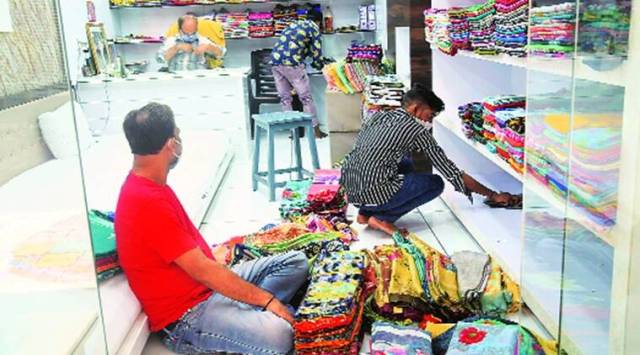Surat traders stare at loss worth Rs 100 crore after Assam ban on power loom-made garments
State BJP president CR Paatil has assured to intervene in the matter after the Saket group, an NGO of textile traders from Surat, on March 5 made a representation to him against the Assam government's move.
 The Federation of Surat Textile Traders Association met Union Minister of Textiles and Railways Darshana Jardosh to find a way ahead to clear the ready stock of mekhela sadors from Surat. (Express File Photo/Representational)
The Federation of Surat Textile Traders Association met Union Minister of Textiles and Railways Darshana Jardosh to find a way ahead to clear the ready stock of mekhela sadors from Surat. (Express File Photo/Representational) Textile traders from Surat are staring at a loss of around Rs 100 crore in the aftermath of Assam government’s ban on the sale of power loom-produced mekhela sador, gamosa, aronai and other traditionally hand-woven garments from March 1 to April 14 in the run up to Rongali Bihu. The traders, who were preparing for the upcoming festive season with ready stocks, fear loss of business due to the unprecedented ban.
“If such a ban is strictly executed, the textile traders of Surat city will face a great loss in business. Currently, stocks of mekhela sadors worth around Rs 100 crore are ready in the godowns of Surat traders. Some are in transit on the way to Assam, while many are lying in the retail showrooms in Assam. If such goods are not sold, it will be returned back to Surat and no payment will be made. The annual turnover from the sale of mekhela sadors is between Rs 600 crore and Rs 700 crore,” said Sawarmal Budiya, a senior member of SAKET Group and former president of the Federation of Surat Textile Traders Association (FOSTTA).
Meanwhile, state BJP president CR Paatil has assured to intervene in the matter after the Saket group, an NGO of textile traders from Surat, on March 5 made a representation to him against the Assam government’s move. “They (the traders) have sought to request the Assam government to give some time to clear the stocks. The traders have also assured that once the current stock of mekhela sadors is cleared, they would not manufacture it again. We will make representation to the Assam Chief minister and also talk to the elected MP from Assam to give some time to the traders to clear the mekhela sador stocks prepared by the Surat traders,” said Paatil.
On March 4, the Federation of Surat Textile Traders Association (FOSTTA) met Union Minister of Textiles and Railways Darshana Jardosh to find a way ahead to clear the ready stock of mekhela sadors from Surat. “Her response was positive. She assured us that she will talk to the Assam government and try to bring out the solution on this issue,” said FOSTTA president Manoj Agrawal.
However, Assam government spokesperson Pijush Hazarika said the state government’s priority is to protect local producers. “Our priority is that we need to protect the interests of our local producers and the women who work on handlooms. If the Gujarat government says or does something, we’ll see. These powerloom operators don’t just produce mekhela sador but also our traditional gamosa in a way that the quality and properties are compromised, which we cannot (afford to) have,” he said.
Mekhela sador, traditionally made by handloom weavers from Assam, is retailed at a price of Rs 3,000-Rs 4,000. However, the power loom-made mekhela sadors by Surat textile merchants are cheaper and are sold at around Rs 500-Rs 600. “The Surat-made mekhela sadors are in high demand as they are cost-effective,” Agrawal said. There is a high demand for the attire ahead of the Bihu festival that starts from April 14.
In Surat, traders use polyester, cotton, nylon and kota yarns to make mekhela sadors on power looms, while traditional weavers from Assam use silk and khadi, said Budiya.
Surat has nearly 65,000 textile shops across 170 textile markets that employ more than a lakh of people.
(With inputs from ENS, Guwahati)







